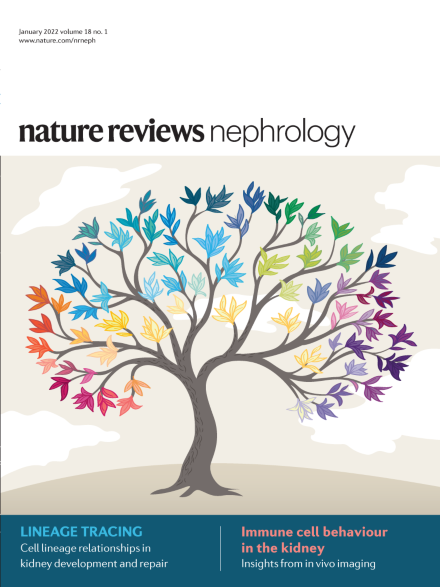Consequence of microvascular inflammation in transplantation
IF 28.6
1区 医学
Q1 UROLOGY & NEPHROLOGY
引用次数: 0

移植手术中微血管炎症的后果
由于认识到在没有循环供体特异性抗-HLA抗体(DSAs)的情况下也可能发生移植物微血管炎症,因此在2022年《班夫肾脏移植物病理学分类》的诊断框架中加入了两个新的类别:微血管炎症或损伤 (MVI)、DSA 阴性和 C4d 阴性",包括无抗体介导反应证据的异体移植排斥反应病例;"可能的抗体介导排斥反应",包括有轻微微血管炎症但无 C4d 沉积的 DSA 阳性病例。在2024年ASN肾脏周上发表并发表在《新英格兰医学杂志》上的新研究结果深入揭示了这些新表型的临床重要性。"研究人员亚历山大-卢比(Alexandre Loupy)解释说:"我们的研究揭示了微血管炎症的不同表型,每种表型都与疾病进展和长期移植物失败的不同风险有关。研究人员亚历山大-卢比(Alexandre Loupy)解释说:"这凸显了临床上识别这些表型对规范肾脏诊断、改善患者风险分层和治疗的重要性。"对长期移植物预后的评估显示,尽管表现出相似的临床特征,但与非排斥相关诊断的患者相比,根据2022年班夫分类有微血管炎症证据的肾移植受者发生异体免疫介导的疾病进展的风险更高,长期移植物存活率更差。具体来说,与未诊断出微血管炎症的患者相比,诊断为 MVI、DSA 阴性和 C4d 阴性或可能存在抗体介导的排斥反应的患者在中位 5 年的随访中抗体介导排斥反应的累积发生率较高,但与活动性抗体介导排斥反应的患者相比,累积发生率较低。同样,两种微血管炎症表型患者发生移植肾小球病变或病情恶化的风险相似,但低于活动性抗体介导的排斥反应患者。
本文章由计算机程序翻译,如有差异,请以英文原文为准。
求助全文
约1分钟内获得全文
求助全文
来源期刊

Nature Reviews Nephrology
医学-泌尿学与肾脏学
CiteScore
39.00
自引率
1.20%
发文量
127
审稿时长
6-12 weeks
期刊介绍:
Nature Reviews Nephrology aims to be the premier source of reviews and commentaries for the scientific communities it serves.
It strives to publish authoritative, accessible articles.
Articles are enhanced with clearly understandable figures, tables, and other display items.
Nature Reviews Nephrology publishes Research Highlights, News & Views, Comments, Reviews, Perspectives, and Consensus Statements.
The content is relevant to nephrologists and basic science researchers.
The broad scope of the journal ensures that the work reaches the widest possible audience.
 求助内容:
求助内容: 应助结果提醒方式:
应助结果提醒方式:


